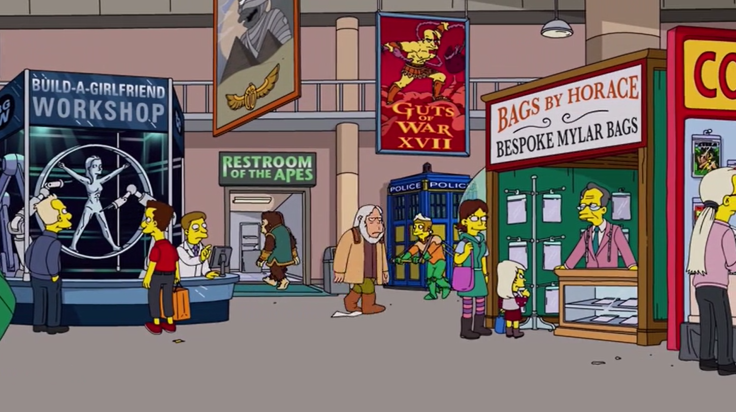The Simpsons Season 7 episode “A Fish Called Selma” showcased former bit character Troy McClure (Phil Hartman), struggling B-list actor and pescaphiliac, as he tried to salvage his career with a phony marriage to Marge’s sister, Selma Bouvier (Julie Kavner). The episode’s highlight, a little musical called “Stop the Planet of the Apes, I Want To Get Off!” became one of the series’ most famous jokes. You probably remember the lyrics, or at least the “Dr. Zaius! Dr. Zaius!” part.
The Planet of the Apes musical succeeds not just because it’s loaded with jokes like Dr. Zaius breakdancing and McClure, as Charlton Heston’s character Colonel Taylor, playing the piano and declaring, “I hate every ape I see, from chimpan-A to chimpan-Z,” but also because of its clear reverence for the 1968 film it’s spoofing. McClure’s Planet of the Apes musical wasn’t even the first time The Simpsons made a joke of the famous sci-fi series, or even the second. The series has a surprisingly long history with the sci-fi classic, mostly outshone by the blinding glow from “Stop the Planet of the Apes, I Want To Get Off!”
Season 3 “I Married Marge”
Season 5 “Rosebud”
Season 5 “Deep Space Homer”
Season 6 “Bart’s Girlfriend”
Season 11 “Pygmoelian”
While there isn’t a unified theory uniting The Simpsons and Planet of the Apes, the most common thread is one not actually shared by their most famous Apes joke: that either the Planet of the Apes is destined to be real, or that Homer believes that to be the case. In both “I Married Marge” and “Deep Space Homer,” Homer is certain of the planet’s reality — either in the now or in the future, society will fall to apes. In “Rosebud,” the far future, one million A.D., is ruled by apes, with Homer clones as their slaves. Even in “A Fish Called Selma,” Troy McClure responds to his agent’s job offer (“Have you heard of Planet of the Apes?”) with a presumption of its reality: “The movie or the planet?” he responds.
In all these references we see what The Simpsons pioneered and Family Guy destroyed: the inextricability of modern life and their popular fictions. From the vantage of 2017, where all of culture is self-cannibalizing and referential, where society itself has taken on the plastic aspect of its own imitation, The Simpsons’ pop culture reflection looks like banality. While earlier shows like Moonlighting employed self-referentiality and cultural pastiche, it was the freedom of animation that hyper-charged The Simpsons, creating an unlimited capacity for references unified under a single aesthetic. The Simpsons didn’t cut away to a Planet of the Apes spoof, but instead wove them into the day-to-day fabric of The Simpsons household.
The Simpsons goes beyond merely responding to Planet of the Apes as a pop culture remnant. Most of the references may have been to the original, especially its most famous lines and twist ending, but Itchy & Scratchy Show episode “Planet of the Aches” is an exception (featured in Season 5 episode “Bart of Darkness”), which not only opened with an accurate recreation of General Ursus’ helmet from Beneath the Planet of the Apes, but also featured a riff on the psychic mutants living in the underground ruins of New York, beneath the ape civilization. This is a deep cut:
It’s very probably the case that Fox has The Simpsons to thank for the cultural staying power of Planet of the Apes. The last entry in the series (each of which made less money than the one before), Battle for the Planet of the Apes, was released in 1973. A live-action TV series and Planet of the Apes cartoon both failed to find mainstream purchase. The last issue of Marvel’s Planet of the Apes comic series was released in February 1977, just in time to cede the sci-fi future to Star Wars. When “A Fish Called Selma” aired in 1996, it introduced Planet of the Apes to the oldest of the millennials, the audience that would become the box office backbone for Rise of the Planet of the Apes and its two sequels.
Just as Planet of the Apes first defined The Simpsons’ relationship with pop culture, at once mocking and worshipful, the sci-fi series also provides a handy shorthand for The Simpsons eventual collapse into irrelevance. The most recent reference to Planet of the Apes (other than the bathroom gag, above) came attached to Season 28’s “Treehouse of Horror XXVII,” in a couch gag also released as a virtual reality video for Google Cardboard. The extended spoof, “Planet of the Couches,” takes Planet of the Apes and replaces the apes with… couches. Like most bad spoofs, it treats the recreation of Planet of the Apes as the comedic end in itself, instead of as a platform for further jokes or insight. And it’s hard to escape the sense that the parody is more about The Simpsons, alluding back to the glory days of “A Fish Called Selma,” more than its surface target: Planet of the Apes. The combination of nostalgia and spoof for spoof’s sake is poisonous to laughter. But at least The Simpsons plans to die how it lived: stuck forever on a planet of apes.














![[EG April 19] Best 'Stardew Valley' Mods That Will Change](https://d.player.one/en/full/226012/eg-april-19-best-stardew-valley-mods-that-will-change.png?w=380&h=275&f=955520b8313253ee3c39c791f6210f38)



